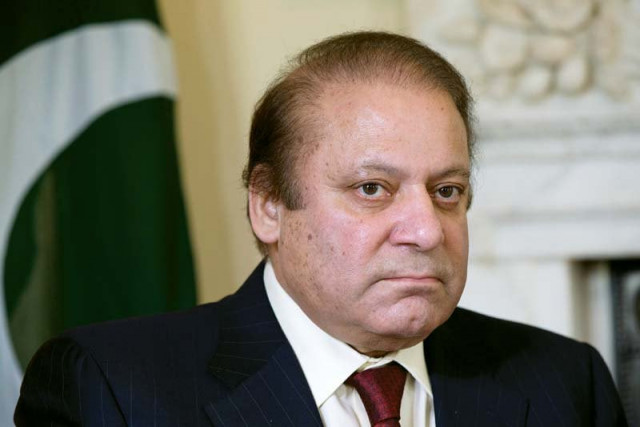PML-N govt ‘failed to fulfill’ manifesto vows
Only six of the 89 goals could be achieved, says report

Prime Minister Nawaz Sharif. PHOTO: FILE
Even in areas where it had initially shown some progress, the performance deteriorated during January-June period of 2017, says the report from the Islamabad-based Policy Research Institute of Market Economy (PRIME).
The PRIME report gauges the economic performance of the ruling party on the basis of implementation of its economic manifesto announced before the elections. It is the ninth such report covering January-June period of the fourth year of the PML-N government.
Senate to discuss govt performance at ICJ
According to the report, the progress has been reversed on eliminating VIP culture by reducing expenses incurred on the Prime Minister Office and the Presidency; appointing independent professional boards of state-owned entities; eliminating circular debt; and notifying the tariffs determined by the National Electric Power Regulatory Authority.
Similarly, the progress on the goals of improved regulatory environment at the national level, publication of an annual tax directory and determining upfront tariffs for wind, solar, small hydel and biomass projects was also reversed, says the report, noting that the load-shedding of power persisted and “it may not be a far-fetched proposition that it’s not going away any sooner, even in the next year”.
The report points out that of the 89 targets, only six stand achieved, although there are serious question marks on the claim of achievement of budget deficit reduction target.
After the completion of four years, the average score in the area of economic revival stands at 4.28, which is below the satisfactory level and indicates lack of policy direction. The average score in the area of energy security remains 4.71.
The PML-N’s overall average score for four-year period now stands at 5.05. “The 5.05 doesn’t mean a glass half full, but it means a glass more than half empty,” according to the PRIME.
Govt borrowed Rs2tr to finance budget deficit in 2016-17
The areas where the government’s performance was bad were the economic growth rate target, which the PML-N could not double to 6 per cent as it promised in the election manifesto. It had also promised to bring down the budget deficit to 4 per cent but the latest estimates show that the deficit will be over 5.3% of the GDP for fiscal year 2016-17. The average score on budget deficit target was 4.45.
The only visible progress was on bringing down the inflation to single digit, which was mainly because of the overall low global inflationary environment. On the target of industry and trade, the average score was 4.19.
One of the worst performing areas was tax reforms where the score remained close to the bottom -2.87. Similarly, the government could not reverse the deteriorating fiscal and administrative performance of state-owned enterprises, with an average score of 3.25.
The government somehow managed to build confidence of the private sector but it was still not up to the mark.
The two components where it performed well were infrastructure building and creating job opportunities.
Energy Security
In the energy sector, the government could not reform NEPRA and its average score was just 3.38. Likewise, the reforms could not be introduced in power distribution and generation companies where the PML-N’s average score remained below 3.8.
These entities kept on causing heavy losses, which the government tried to cover by charging various kinds of surcharges from the power consumers.
The PML-N also failed to meet its election promise of permanently eliminating the circular debt that has again piled up to Rs400 billion. The average score on this target was only 3.38.
The Oil and Gas Regulatory Authority could not be reformed either and the PRIME gave the government a poor score of 3.75.
There was no development on the goals of converting at least 50 per cent of the remittances from Overseas Pakistanis into investments and reforming tariffs to eliminate anti-export bias. The PML-N could not establish an Equity Fund to facilitate investment by private and public sectors. It could not either fulfill its promise to tax all income, including the agriculture income, and failed to reduce the number of federal and provincial taxes, according to the PRIME.
Status quo maintained
There were areas where the previous status persisted, which did not mean that the government showed any improvement. There was no further progress in reduction in losses of PSEs and developing clusters for industries. The status quo was also maintained on the goal of bringing informal economy into the tax net, reducing tax evasion, rationalising tax rates and ensuring tax compliance by small businesses.
The government could not meet its promise of rationalising sales tax by ensuring standard rates for all items.



1724319076-0/Untitled-design-(5)1724319076-0-208x130.webp)















COMMENTS
Comments are moderated and generally will be posted if they are on-topic and not abusive.
For more information, please see our Comments FAQ